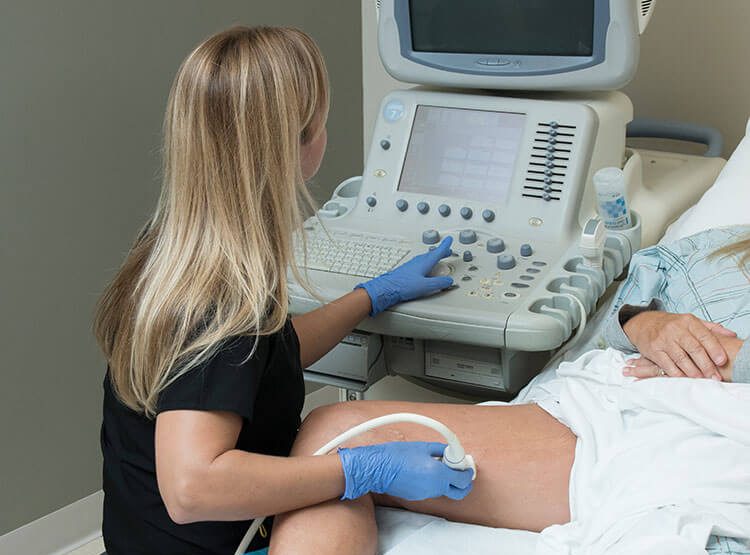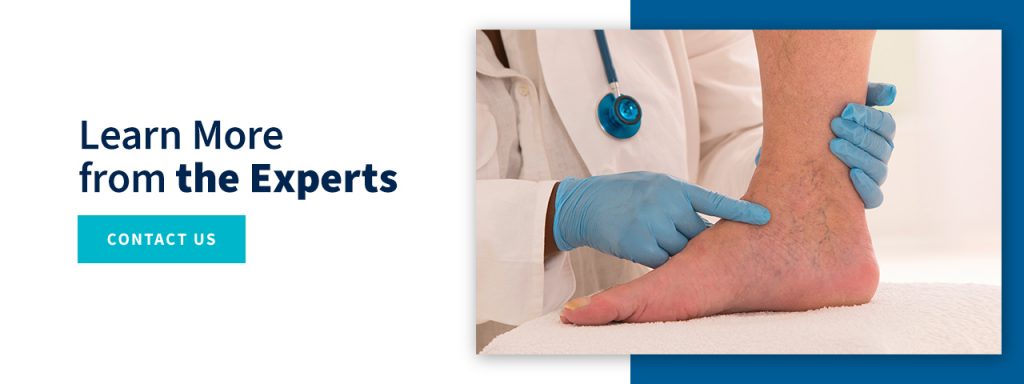
The symptoms of venous insufficiency could raise questions: Can I experience relief from these itching, heavy legs? Can I get rid of these visible veins on my legs? How would I go about seeking treatment? If you’re struggling with venous insufficiency, your first step should be to visit a vascular physician in Orlando. The specialists at Central Florida Vein & Vascular Center are dedicated to developing the best treatment plan possible for our patients. As a result, we offer many treatment options which cater to each patient’s individual needs. Remember, what has worked well for another person dealing with venous insufficiency may not be the best course of action for you. Before a vein specialist can develop the best possible treatment plan, they must first assess your condition, often with a diagnostic ultrasound. A proper diagnosis is necessary to definite the best treatment.
Central Florida Vein & Vascular Center conducts diagnostic vascular ultrasounds, also referred to as a venous reflux test, in order to test how well the valves in the legs are functioning. The current state of your vein valves plays a huge role in venous insufficiency. These valves are responsible for properly circulating blood throughout your body. When they are weakened or damaged, blood pools in the veins, often in the lower leg. This causes the vein to swell and become a varicose vein. A venous reflux test allows the specialist to check on the current state of the vein valves before deciding on the best treatment.
Weakened or damaged vein valves come packaged with a number of symptoms, and those who experience these symptoms should stop by for a venous reflux test. These symptoms can be seemingly small, such as skin irritation or discoloration, or they can also conclude more frustrating symptoms such as itchiness, restless or fatigued legs, or heavy, aching, or sore legs.
Not everyone who is administered a venous reflux test is symptomatic. People who are predisposed to venous insufficiency can also be tested. By predisposition, we aren’t just referring to those who have a family history of venous insufficiency. Individuals who spend much of their day sitting or standing, those who have a history of deep vein thrombosis, and women who have been pregnant also have a predisposition for venous insufficiency.
A venous reflux test shares one major thing in common with current treatment options: it’s quick and easy. This simple procedure is performed by one of our expertly trained ultrasound techs right in our office. During a venous reflux test, an ultrasound is used to help a doctor see deeper into the skin of the leg and witness the heart of the problem. They can check how well the valves are functioning, the size of the vein, and whether the blood is flowing as it should. The procedure is quick and painless, lasting only 30 to 60 minutes depending on whether or not the doctor needs to view both legs. There are no required preparations for the procedure, so there’s no need to worry about drastically shifting your day in order to see a specialist.
This diagnostic vascular ultrasound, or venous reflux test, should give your doctor the information needed to determine a diagnosis and treatment plan. Central Florida Vein & Vascular Center offers a multitude of treatment options for taking care of both varicose and spider veins.
Everything happens in its proper order. If you forget a step in a math problem, you’ll end up with a wrong answer. Similarly, if you skip a step when handling your venous health, it’s possible that you may not get the treatment you need. You don’t want to miss the important step of going through a diagnostic test before looking into treatment procedures. When a specialist knows exactly what you’re dealing with—whether it’s cosmetic spider veins or painful, swollen varicose veins—they know what tools they need to use to get the job done.

When you visit a vascular physician in Orlando, you should be confident that you’re being prescribed the best treatment possible. We at Central Florida Vein & Vascular Center take your venous health seriously and want you to leave our office with healthy legs that you don’t feel self-conscious about. The specialists at our facility have dedicated their lives to vein care so that you can be in good, knowledgeable hands when you step into our office. We make sure you get the diagnostic attention you need so that when it’s finally time to discuss treatment, you’ll be getting what is best for you as an individual. If you’re concerned about your venous health, contact us today to schedule a consultation. You can also browse our blogs for more information about venous insufficiency and the treatment options we offer.